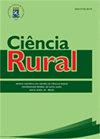晚春耐霜冻杏新品种鉴定:果实物理生化性状、挥发性香气化合物
IF 0.9
4区 农林科学
Q3 AGRONOMY
引用次数: 1
摘要
摘要:晚春霜冻是制约杏生长的重要非生物胁迫因子之一。在本研究中;对土耳其杏育种项目选育的13个晚春抗冻杏杂交种鲜果样品进行了果实物理、生化特性和挥发性香气成分的测定。结果表明,不同基因型杏在果实物理生化特性和挥发性香气化合物方面存在较大差异。果实大小在27.2 ~ 60.5 g之间,总可溶性固形物在13.6 ~ 17.4%之间,总胡萝卜素在26.6 ~ 42.8 mg之间。总酚类物质含量354.2和673.1 (GAE.100 g-1)。共鉴定出42种风味成分,属于不同的风味化合物群。鉴定杏基因型中检测到的主要挥发性香气化合物组有;醛、酮、酯、醇、萜烯、酸和其他化合物。在检测到的化合物中;己醛、2-己烯醛、1-己醇、2-己烯-1-醇、柠檬烯的含量最高。己醛在55.8µg和528.5µg之间变化。kg-1和2-己烯-1-醇在25.7和297.9µg之间变化。公斤-1鲜重。相关分析显示,部分香气成分与果实生化品质性状具有显著的相关性。可滴定酸度的酯类(r=0.79)和总胡萝卜素(r=-0.61)之间存在显著相关性,醛类与总可溶性固形物高度相关(r=-0.69)。研究结果对杏的食品分析、栽培和育种研究具有一定的指导意义。本文章由计算机程序翻译,如有差异,请以英文原文为准。
Characterization of new late-spring-frost-tolerant apricot hybrids: physical and biochemical fruit quality attributes, volatile aroma compounds
ABSTRACT: Late spring frosts is one of the most important restricting abiotic stress factors of apricot growing worldwide. In this study; some physical, biochemical fruit quality characteristics and volatile aroma compounds were determined in fresh fruit samples of thirteen late spring frost tolerant apricot hybrids recently obtained from Turkish apricot breeding programme. A wide variation was reported among apricot genotypes in all of the evaluated physical and biochemical fruit characteristics and also volatile aroma compounds.Fruit size varied between 27.2 and 60.5 g, total soluble solids between 13.6 and 17.4 %, total carotene 26.6 and 42.8 (mg.100 g-1), and total phenolics content 354.2 and 673.1 (GAE.100 g-1). A total of 42 flavor components belonging to various flavor compound groups were identified. The main volatile aroma compound groups detected in the assessed apricot genotypes were; aldehydes, ketones, esters, alcohols, terpenes, acids, and other compounds. Among the detected compounds; Hexanal, 2-Hexenal, 1-Hexanol, 2-Hexen-1-ol, Limonene were the most abundant compounds in terms of concentration. Hexanal varied between 55.8 and 528.5 µg.kg-1, and 2-Hexen-1-ol changed between 25.7 and 297.9 µg.kg-1 fresh weight. Correlation analysis revealed significant correlations among some aroma compounds and biochemical fruit quality characteristics. Significant correlations were reported for esters with titratable acidity (r=0.79) and total carotene (r=-0.61) and aldehydes were found as highly correlated with total soluble solids (r=-0.69). The results of the study will be beneficial in terms of food analysis, cultivation, and breeding studies of apricot.
求助全文
通过发布文献求助,成功后即可免费获取论文全文。
去求助
来源期刊

Ciencia Rural
AGRONOMY-
CiteScore
1.70
自引率
0.00%
发文量
233
审稿时长
2-4 weeks
期刊介绍:
The purpose of Ciência Rural is to publish the results of original research, note and reviews which contribute significantly to knowledge in Agricultural Sciences. Preference will be given to original articles that develop news concepts or experimental approaches and are not merely repositories of scientific data. The decison of acceptance for publication lies with the Editors and is based on the recommendations of Editorial Comission, Area Committee and/ or ad hoc reviewers. The editors and reviewers are external to the institution.
 求助内容:
求助内容: 应助结果提醒方式:
应助结果提醒方式:


